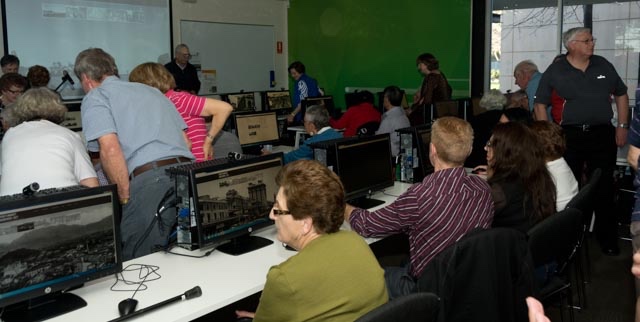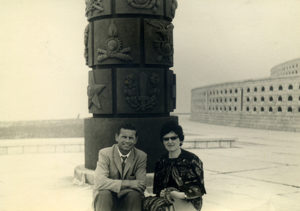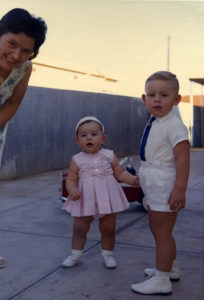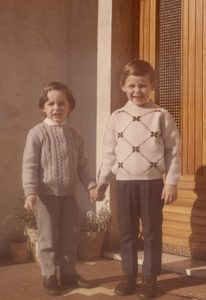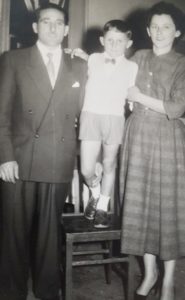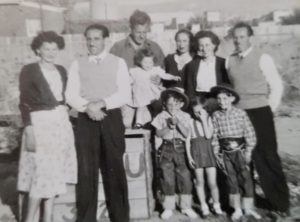Michael Campbell is our guest blogger this month. Michael is a former school principal and is the administrator for this website. As administrator he is responsible for the look and feel of the site as well as the site security. When the website was launched in May 2014, Michael took photos – see above.
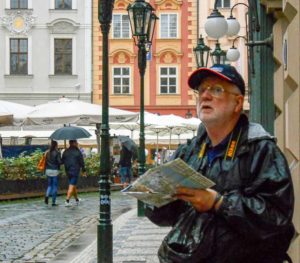
It is common for people who visit this website to comment positively on the information and photos for each family. Following are three comments by readers and viewers:
I see that you are putting all your excellent work in a time frame, so that all your research comes to us as a historical report of what our parents achieved in those hard times that brought them to Adelaide.
It is wonderful that we are able to know a little more of their quite extraordinary history – the merging of the culture of Italy, which they brought to us, and making Australia today a much more multi-cultural society.
Thank you for giving me the results of your work. I’ve read it and looked at the photos. Your passion about these families is curious. It is important to look for our roots so that we go forward with more certainty. Goodbye. A hug from the Veneto …
Many people who visit the site have a personal connection with the pioneer families. However, the site is recognised by a wider audience for its cultural and historical significance to Australian society.
The State Library of South Australia has sole responsibility for preserving access to a large proportion of the South Australian historical record for present and future generations.
Since the early 1900s, the State Library has also been entrusted with the archival records of thousands of businesses, organisations and individuals, hundreds of thousands of photographs, and unique audio visual and electronic material including film footage and oral histories. Over time, parts of the reference collection have grown in significance to warrant long-term preservation.
In 2015 the State Library selected the Veneto Market Gardeners 1927 website for preservation on the website of the National Library of Australia. This preservation is carried out by ‘Trove’ is an online service created by the National Library of Australia to offer free public access to a wide range of information including historical and contemporary materials. Trove has taken a snapshot of the Veneto market gardeners website each year since March 2015.
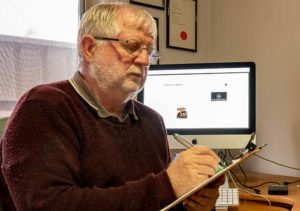
This means that readers and interested parties can view the website as it was each March from 2015 to 2019.
When you visit this site, you will be presented with the front page. Click on the year to see the changes since 2015.
I encourage those who engage with this website to take a moment to visit the archived site to see the many changes that have been made over the past 5 years.
You can view the archives of the website by clicking here.
Michael Campbell
Un sito web di importanza culturale e storica
Michael Campbell è il nostro blogger questa volta. Michael è un ex preside di scuola ed è l’amministratore di questo sito web. Come amministratore è responsabile per l’aspetto graffico ed anche della sicurezza. Michael ha scattato foto al lancio del sito web nel maggio 2014. Vedete sopra.

Le persone che visitano questo sito di solito fanno commenti positivi sulle informazioni e le foto che vedono.
Tre dei commenti sono:
Vedo che stai publicando il tuo eccellente lavoro in un piccolo spazio di tempo in modo che la tua ricerca ci giunga come rapporto storico di ciò che i nostri genitori hanno raggiunto in quei tempi difficili e che li hanno portati a vivere ad Adelaide.
È meraviglioso che siamo in grado di conoscere un pò di più della loro storia davvero straordinaria – la fusione della cultura italiana che ci hanno portato – e fare dell’Australia quello che è oggi, una società molto più molticulturale.
Grazie di avermi informato del buon risultato del tuo lavoro. Ho letto e visto le foto. E’ curiosa la tua passione per queste famiglie, cercare le nostre radici è importante per andare avanti con più certezze. Buona giornata. Un abbraccio dal VENETO.
Tante persone che visitano questo sito hanno una connessione personale con le famiglie dei pionieri. Altri sono interessati in questo progetto. Comunque il sito è riconosciuto da una maggioranza per la sua storia culturale e storica significanza della società Australiana.
Dal principio del 1900, la biblioteca statale di Sud Australia ha la responsabilità di preservare i documenti archivali. Ci sono migliaia di documenti di aziende, organizzazioni e centinaia di migliaia di fotografie. Ci sono anche materiali unici di audio visuali e di materiali eletronico includendo film e storie orali come le interviste di questo sito.
La biblioteca nazionale si può accedere gratis via un servizio online che si chiama ‘Trove’. Si possono trovare l’informazioni includendo materiali storici e contemporanei.

‘Trove’ ha preso una foto di questo sito web ogni anno fin dal marzo 2015. Ciò significa che le parti interessate possono andare a vedere il sito web ogni anno dal 2015 al 2019.
Se visitate questo è possibile vedere le modifiche al sito web. Clicca sull’anno dal 2015.
 Incoraggiamo quelle persone che vedendo questo sito di prendere un momento per visitare e vedere i tanti cambiamenti che sono occorsi nello spazio degli ultimi 5 anni. Potete guardare gli archivi del sito cliccando qui.
Incoraggiamo quelle persone che vedendo questo sito di prendere un momento per visitare e vedere i tanti cambiamenti che sono occorsi nello spazio degli ultimi 5 anni. Potete guardare gli archivi del sito cliccando qui.
Michael Campbell
